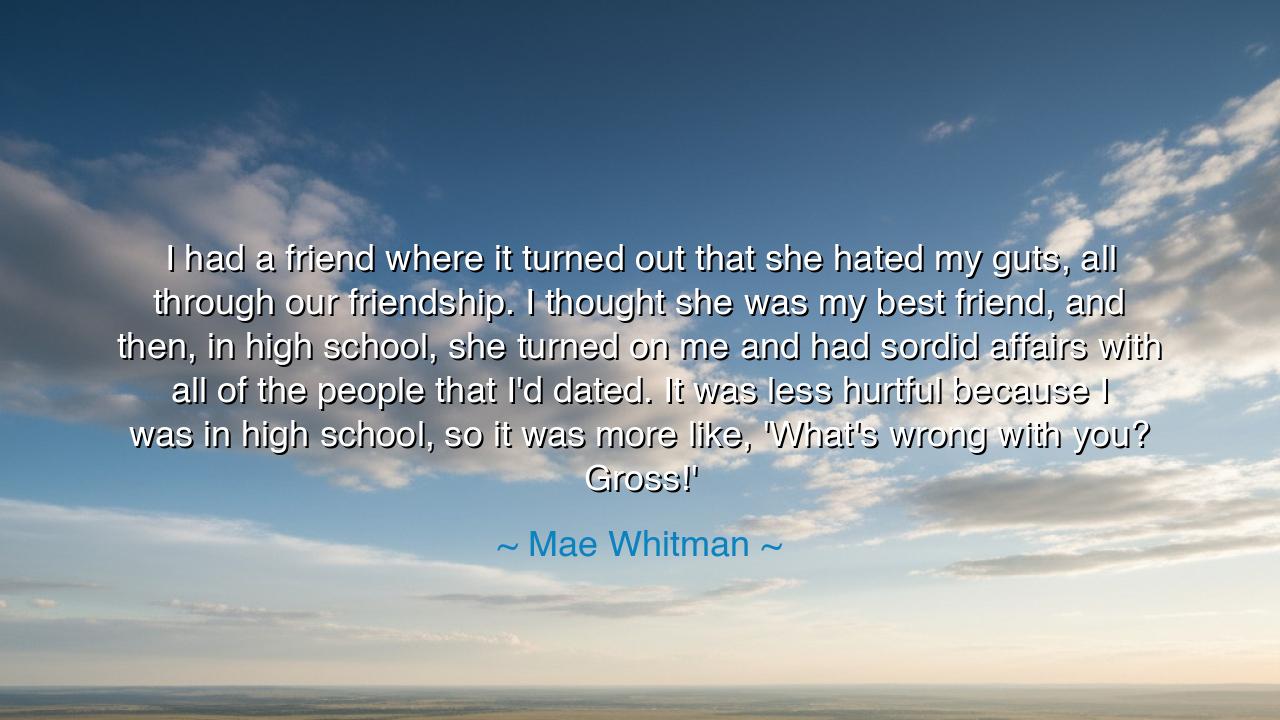
I had a friend where it turned out that she hated my guts, all
I had a friend where it turned out that she hated my guts, all through our friendship. I thought she was my best friend, and then, in high school, she turned on me and had sordid affairs with all of the people that I'd dated. It was less hurtful because I was in high school, so it was more like, 'What's wrong with you? Gross!'






"I had a friend where it turned out that she hated my guts, all through our friendship. I thought she was my best friend, and then, in high school, she turned on me and had sordid affairs with all of the people that I'd dated. It was less hurtful because I was in high school, so it was more like, 'What's wrong with you? Gross!'" These words from Mae Whitman illuminate a painful yet common truth about the vulnerability and complexity of friendship. Friendship, which is often thought to be built on mutual trust, affection, and shared experiences, can, at times, reveal itself to be a fragile bond—one that is susceptible to betrayal, deceit, and hidden resentments. Whitman’s story speaks to a deeper, universal truth about the betrayal of trust, and the emotional turmoil that comes when someone we consider a close friend turns against us.
In the ancient world, the bond of friendship was highly revered, yet it was understood that trust could easily be broken, especially when one person acted in a way that betrayed the very essence of that bond. Aristotle, in his work on ethics, wrote that the highest form of friendship is one based on mutual virtue, where both individuals support each other in becoming better versions of themselves. In such friendships, betrayal was anathema, for it destroyed the very foundation upon which the relationship rested: honesty, loyalty, and shared values. A friendship where one person secretly harbors resentment, or acts in self-interest, while pretending to be close, is a false friendship—and one that can lead to deep emotional pain when it is revealed.
Consider the ancient Greek myth of Jocasta and Oedipus. In their story, Jocasta, unaware of the true nature of her relationship with Oedipus, believed she was acting in the best interests of her family and society. However, her own actions—though born of ignorance—ultimately led to betrayal and tragedy. In Oedipus's case, his relationships were marred by tragic misunderstandings and the painful revelation of deceit. Though the myth focuses on themes of fate and revelation, it also echoes the darker side of friendship and loyalty—when truth is hidden, and betrayal emerges like a snake from the grass. Just as Oedipus was blindsided by the painful truths about his family, so too does Whitman reveal how betrayal, even from someone she thought was a best friend, can cut deeply.
In Whitman’s own experience, the betrayal was less about the intense emotional devastation that comes with a profound adult relationship and more about the discovery of the falsehoods in high school—a time of growing and learning. Her reaction, though less hurtful in the moment, reveals something fundamental about the nature of betrayal: it often brings clarity. Though it can shatter trust, it also provides a deeper understanding of the true nature of relationships. When Whitman describes her reaction with a sense of disgust ("What’s wrong with you? Gross!"), she is, in a sense, purging herself of the false connection. The truth, though painful, allows her to move on, untethered by a bond that was never genuine.
In the ancient world, philosophers like Socrates understood the significance of honesty in relationships. For Socrates, the foundation of any meaningful relationship, whether of friendship or love, was rooted in truth and virtue. To mislead or deceive was to poison the relationship and render it meaningless. This is why Socrates emphasized the importance of self-examination—for in understanding ourselves, we can better understand the true nature of the bonds we form. Whitman’s experience serves as a modern-day reminder of this ancient wisdom: when we uncover the truth of a relationship, we may feel disgust or pain, but we are ultimately freed from the falsehoods that once bound us.
The lesson here is one of self-awareness and personal growth. Friendship is a delicate bond that requires both parties to be truthful and genuine. When we find that a relationship is based on deceit or hidden resentments, it is vital to confront the truth, even if it brings discomfort. Just as Whitman’s experience with her former friend reveals a painful but necessary truth, we too must be willing to confront and accept the realities of our relationships. Betrayal, while painful, can serve as a powerful teacher, showing us what true friendship should be—and what it should not. It reveals the importance of being authentic and honest with ourselves and others.
In our own lives, we must learn to cultivate relationships that are based on honesty, trust, and mutual respect. When we feel betrayed, we must not shy away from the truth, but face it head-on, as Whitman did, knowing that the truth will eventually set us free. Friendship, at its core, is about being genuine and vulnerable with each other. It is about sharing both our strengths and weaknesses without fear of judgment or manipulation. In learning to trust ourselves and our instincts, we can avoid the pain of false friendships and embrace the beauty of relationships that are founded on mutual care and respect. May we always seek to form connections that are rooted in the truth, and may we have the courage to walk away from those that seek to deceive us, knowing that true friendship is built on nothing less than honesty and authenticity.






AAdministratorAdministrator
Welcome, honored guests. Please leave a comment, we will respond soon